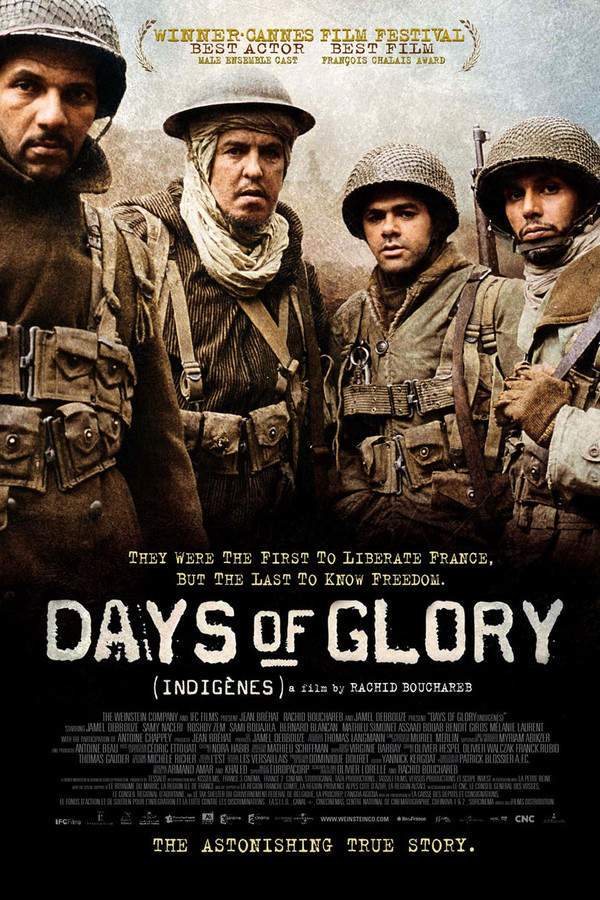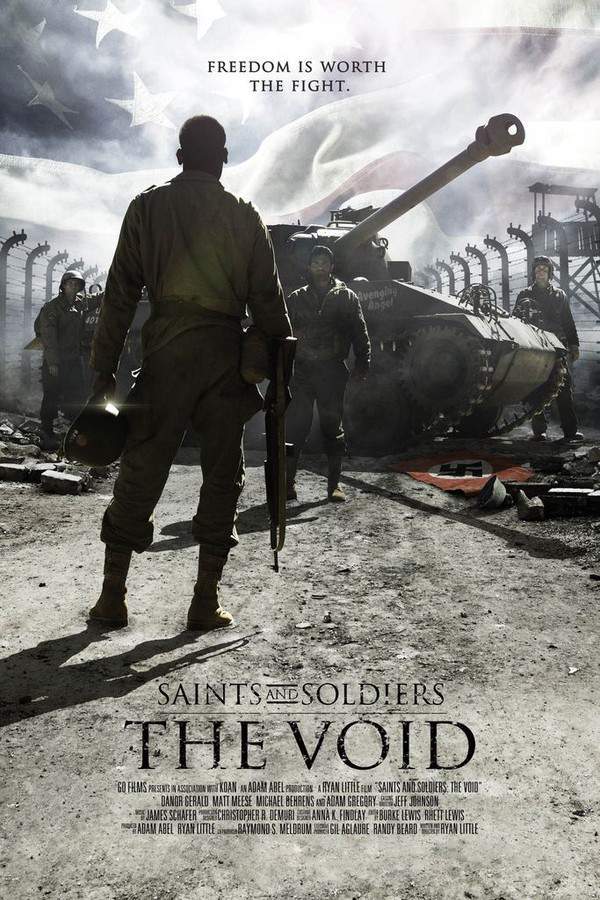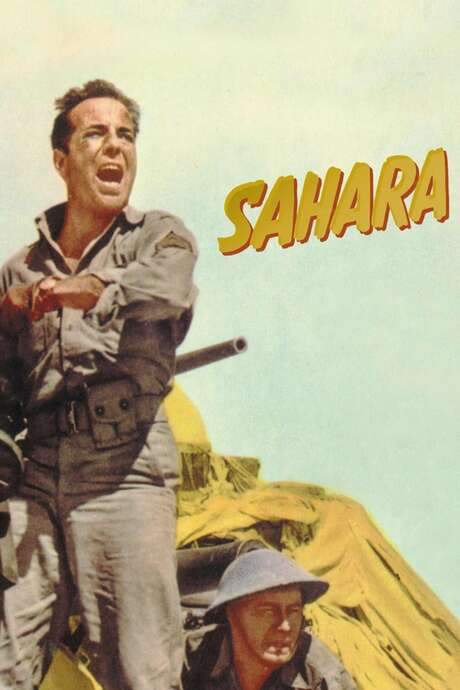
Days of Glory 2006
Directed by

Rachid Bouchareb
Made by

IFC Films
Test your knowledge of Days of Glory with our quiz!
Days of Glory Plot Summary
Read the complete plot summary and ending explained for Days of Glory (2006). From turning points to emotional moments, uncover what really happened and why it matters.
The movie opens its narrative in the tumultuous year of 1943, where a passionate recruiter is fervently persuading local Algerians to enlist in the French military to defend their homeland against the encroaching German forces. Among the eager recruits is Said Otmari, who, despite his mother’s desperate pleas—reminding him that his grandfather went off to war and never returned—rushes to join the other brave souls in the trucks. As he departs, the worry etched across his mother’s face signals the heavy toll that war extracts from families.
Once they arrive in Morocco for basic training, the soldiers are galvanized by a French colonel’s spirited rallying cry, urging them to fight for the nobility synonymous with France. Here, we meet Yassir and his younger brother Larbi, who quickly express regret over enlisting, primarily motivated by financial need. Additionally, there’s a glimpse of Abdelkader, another North African recruit, who is diligently preparing for his Corporal exams.
By 1944, the narrative shifts to Italy as they take their posts in the 2nd Company of the 7th Algerian Infantry Regiment, now led by the newly promoted Corporals: Abdelkader and French Corporal Leroux. They find themselves under the command of Sgt Martinez, a deeply troubled individual who oscillates between belittling his men and presenting their struggles to his superior, Captain Durieux. Martinez’s rough demeanor becomes evident when he identifies Messaoud Souni as an exceptional marksman, assigning him the crucial role of the company’s designated sharpshooter.
One tense training session escalates when a grenade becomes unwittingly affixed to Said’s uniform; in a panic, Martinez tosses it away, narrowly averting disaster, but not without brutally reprimanding Said and dismissing Corporal Abdelkader when he attempts to defend him. The following evening, as they prepare for an assault on a hill the next day, tensions simmer among the men, who express discontent over Martinez’s treatment of Said, though an older soldier interjects that Martinez ultimately means well.
As dawn breaks, the soldiers embark on a perilous climb under an onslaught of fire, striving to overcome both the German enemy and their own artillery’s wrath. Amidst this chaos, Said’s bravery erupts, taking out a German machine gun nest, yet he soon finds himself in a life-or-death struggle with an opposing soldier until Martinez acts swiftly, shooting the German just in time. Meanwhile, Yassir and Larbi opportunistically scavenge prized possessions from the deceased soldiers.
In the aftermath of this harrowing engagement, the French Colonel revels in their victory, hailing it as the first triumph over the Germans since 1940 and commissioning a report that exalts France’s regaining of glory and ally trust. We watch as the soldiers prepare for a return to France; Said approaches Martinez to express his gratitude for saving his life, resulting in Martinez appointing him batman to replace a fallen comrade.
A crucial moment unfolds within the mess hall, where the North Africans first experience the bitter sting of discrimination in the French army as a black soldier is denied access to fresh tomatoes. Martinez orders the man to step aside, which infuriates Corporal Abdelkader. In a powerful act of defiance, he smashes the tomatoes underfoot, proclaiming that if they cannot partake, no one shall. Following this, when Captain Durieux is summoned, Martinez advises him simply to regard them as men—ultimately leading to all soldiers being granted their share of fresh tomatoes, prompting jubilant cheers from the North Africans.
As the story transitions to Provence in August 1944, they are met with warm greetings as liberators. The young marksman Messaoud finds chance romance with a French girl named Irene, discovering intimate comforts he’s never imagined while they navigate their complicated relationship amidst the backdrop of war. However, Yassir and Larbi trudge through their moral decline as they set up a black market scheme.
In October 1944, in the Rhone Valley, Messaoud dreams of a future with Irene while the unit’s camaraderie is tested once more. Letters home go unseen, creating a chasm between the soldiers and their families. Amidst the harsh realities, Martinez and the soldiers grapple with their identities as they witness the growing discontent while reveling in the hope of much-needed leave.
As the year progresses and winter’s frost blankets the Vosges, yet another powerful speech from the Colonel charges the men for a now inevitable attack. The narrative builds tension as we witness the horrific toll of war manifest through continued casualties. An anguished Messaoud pens another letter, only to watch in despair as it gets censored. Tension culminates as Martinez confronts superior officers regarding their treatment, advocating for equitable treatment, yet finding himself at odds with his own prejudices.
A pivotal turning point occurs as Alsace becomes the new battlefield in January 1945. The squad encounters a catastrophic series of events that decimate their numbers, leaving just a handful of survivors navigating the challenges of leadership and unity when faced with imminent danger. Martinez’s reluctant acceptance of Abdelkader as their leader marks a significant shift in their dynamic, with each soldier bearing the weight of their history and allegiance.
Time races ahead, juxtaposing the chaos of war with a future without recognition. The film ultimately extends its narrative depth into Alsace, 60 years later, revealing an elderly Abdelkader’s heartbreak as he lays flowers on the unmarked graves of comrades whose sacrifices have faded into obscurity. The poignant closing statement reflects the ongoing struggle for acknowledgment and rights, illuminating the complexity of the relationships formed in the heat of battle, and the forgotten heroes of colonial France, highlighting a timeless narrative of loyalty and longing that resonates through generations.
Days of Glory Timeline
Follow the complete movie timeline of Days of Glory (2006) with every major event in chronological order. Great for understanding complex plots and story progression.
Recruitment in Algeria
In 1943, local Algerians are encouraged to enlist to defend France from the Germans. Said Otmari, one of the main characters, is eager to join, despite his mother's warning about the dangers he might face, as her own father never returned from war.
Training in Morocco
The recruits arrive in Morocco for initial training, where a French colonel inspires them with fervent speeches about fighting for France's honor. Among them, Yassir and his brother Larbi express regret over their decision to join the army primarily for financial gain.
Arrival in Italy
By 1944, the recruits, known as the 2nd Company of the 7th Algerian Infantry Regiment, are deployed to Italy. Here, they meet their new commanding officer, Sgt Martinez, whose unpredictable nature complicates their daily lives.
Martinez's Leadership
Sgt Martinez spends time assessing his soldiers and recognizes Messaoud as a skilled marksman. However, tensions arise when he puts Said in a dangerous position, leading to conflict between Martinez and the other corporals.
Attack on the Hill
The company faces a harsh battle as they attempt to take a hill against both German forces and friendly fire. During the combat, Said bravely eliminates a German soldier after a moment of hesitation, marking a significant moment of courage.
Celebrating Victory
After a hard-fought victory, the Colonel commends the troops for their success, which he claims is a crucial turning point for France. The men feel proud, but the celebration is tainted by the subsequent discrimination they face in the army.
Encountering Discrimination
The North African soldiers experience discrimination during meal times, sparking outrage. Led by Corporal Abdelkader, they confront their commander over the unjust treatment, ultimately leading to a small victory when they secure proper rations.
Liberation of Provence
In August 1944, the soldiers are greeted as liberators in Provence. Messaoud falls in love with a local woman named Irene, experiencing the joy of companionship amidst the ravages of war.
Desire for Home
By October 1944, Messaoud expresses his longing to live peacefully in Marseille with Irene. Meanwhile, tensions rise as the soldiers note that they seem to receive less respect and opportunity than their French counterparts, despite their sacrifices.
Assault in the Vosges
In November 1944, the company embarks on another dangerous mission, suffering heavy casualties. Abdulkar declares a need for equality in the ranks, as frustration grows regarding the perceived neglect of the North African soldiers.
Dangerous Mission Assigned
When the North Africans are finally granted leave in January 1945, tension remains as they suspect ulterior motives behind their treatment. Corporal Abdelkader is chosen for a perilous mission which may lead to recognition for their valor.
Tragedy Strikes
During their new mission, tragedy ensues when a series of German traps lead to the deaths of key leaders, leaving only a few soldiers behind. Grief and morale plummet as they are forced to determine their next steps in a hostile environment.
Final Stand Against Germans
As they fortify their position against an advancing German troop, the North African soldiers show remarkable bravery. However, the team suffers further losses until they are eventually rescued by French reinforcements, highlighting their valiant but overlooked efforts.
Recognition Denied
Following their success, Corporal Abdelkader seeks acknowledgment but is ignored by higher-ups. His anger grows as he realizes the sacrifices of his comrades will not be honored, encapsulating the disillusionment of North African soldiers.
Closure Years Later
Decades later, an elderly Abdelkader reflects on his experiences as he visits the graves of his fallen comrades. The somber ending reveals a shocking truth about the government's neglect towards soldiers from former colonies, prompting a sense of unresolved injustice.
Days of Glory Characters
Explore all characters from Days of Glory (2006). Get detailed profiles with their roles, arcs, and key relationships explained.
Said Otmari
A young, impassioned soldier eager to join the fight for France despite his mother's fears and reservations. Said embodies bravery and carelessness, navigating the harsh realities of war while dealing with the complexities of duty and survival. His journey highlights the personal toll of conflict as he grapples with loyalty and loss.
Messaoud Souni
A skilled marksman and aspiring lover, Messaoud grapples with the realities of war while yearning for a life with Irene. His character illustrates the tension between duty and personal desire, serving as a symbol of hope and the impact of love amidst chaos. Messaoud's narrative encapsulates the internal conflicts faced by the soldiers.
Abdelkader
A strong-willed Corporal who emerges as a leader among the North African troops, Abdelkader confronts discrimination head-on. His dedication to his fellow soldiers and their cause reveals a profound sense of justice and determination to earn rightful recognition. His internal struggles highlight themes of loyalty and the desire for equality.
Days of Glory Settings
Learn where and when Days of Glory (2006) takes place. Explore the film’s settings, era, and how they shape the narrative.
Time period
1943-1945
The story is set during the tumultuous period of World War II, specifically from 1943 to early 1945. This era is marked by intense conflict, with North African troops fighting alongside the French to liberate Europe from German occupation. The challenges faced by these soldiers reflect the broader socio-political dynamics of colonialism and racial discrimination within the military.
Location
Algeria, Morocco, Italy, Provence, Rhone Valley, Vosges, Alsace
The film takes place across several significant locations during World War II. Algeria is where the North African soldiers originate, while Morocco serves as the site of their initial military training. The battles unfold in Italy as well as the provinces of Provence and Rhone Valley in France, where they are welcomed as liberators, and culminate in the Vosges and Alsace regions where the soldiers face heavy combat and reflection on their sacrifices.
Days of Glory Themes
Discover the main themes in Days of Glory (2006). Analyze the deeper meanings, emotional layers, and social commentary behind the film.
🪖
War & Sacrifice
The movie poignantly explores the themes of war and sacrifice, highlighting the struggles of North African soldiers during WWII. These characters endure physical and emotional challenges, often fighting for a country that discriminates against them, raising questions about loyalty, valor, and the true cost of freedom.
⚖️
Colonial Injustice
Colonial injustice is a prominent theme, showcasing the discrimination faced by North African soldiers in the French army. The narrative reveals the inequalities in treatment, with soldiers fighting valiantly yet receiving neither recognition nor rights. This theme resonates with the historical context of colonialism and its lingering effects.
❤️
Love & Longing
Amidst the chaos of war, love blooms between Messaoud and Irene, representing hope and human connection. Their relationship offers a poignant contrast to the violence of the battlefield, underscoring the longing for peace and normalcy. This theme brings depth to the soldiers' experiences, as they seek solace in personal connections.

Coming soon on iOS and Android
The Plot Explained Mobile App
From blockbusters to hidden gems — dive into movie stories anytime, anywhere. Save your favorites, discover plots faster, and never miss a twist again.
Sign up to be the first to know when we launch. Your email stays private — always.
Days of Glory Spoiler-Free Summary
Discover the spoiler-free summary of Days of Glory (2006). Get a concise overview without any spoilers.
In the throes of World War II, a group of young men from French North Africa answer a call to defend a distant homeland. Their journey takes them from the sun‑baked streets of their villages to the war‑torn landscapes of Europe, where they are thrust into a conflict that tests both their resolve and their dreams of a liberated future. The film paints a stark yet lyrical picture of a world where borders blur under the weight of shared sacrifice, and where the promise of liberty hangs as fragile as the smoke that rises from the battlefields.
The tone balances the gritty realism of frontline warfare with moments of quiet humanity, letting the audience feel the heat of artillery and the cool shade of a brief respite. A muted colour palette evokes the era’s soot‑gray skies, while the soundtrack weaves traditional North African motifs with the somber strains of wartime orchestration, underscoring a narrative that is both intimate and expansive. Beneath the combat’s roar, subtle currents of camaraderie and unease pulse, hinting at the deeper social divides that linger even among allies.
The story’s core follows four distinct personalities. Said arrives with fierce patriotism, driven by a desire to honor his ancestors and protect his mother’s hopes. Abdelkader brings disciplined ambition, his eyes set on rising through the ranks and proving his worth. Messaoud is the quiet marksman, whose steady aim masks a yearning for connection beyond the battlefield. Yassir, pragmatic and occasionally restless, balances his sense of duty with the practical needs that brought him to the front. Their interactions—rife with rivalry, mentorship, and budding friendship—form the emotional backbone of the film.
As the unit moves from the rocky hills of Italy to the liberated fields of Provence, the soldiers confront not only the external threat of the Nazi war machine but also the internal struggle of being both defenders and outsiders. The looming prospect of a final stand in a remote village offers a tense, hopeful climax, leaving viewers eager to see how loyalty, courage, and the lingering shadows of colonial identity will shape their destiny.
Can’t find your movie? Request a summary here.
Movies with Similar Twists and Themes
Uncover films that echo the narrative beats, emotional arcs, or dramatic twists of the one you're exploring. These recommendations are handpicked based on story depth, thematic resonance, and spoiler-worthy moments — perfect for fans who crave more of the same intrigue.
Featured on this page

What's After the Movie?
Not sure whether to stay after the credits? Find out!
Explore Our Movie Platform
New Movie Releases (2025)
Famous Movie Actors
Top Film Production Studios
Movie Plot Summaries & Endings
Major Movie Awards & Winners
Best Concert Films & Music Documentaries
Movie Collections and Curated Lists
© 2025 What's After the Movie. All rights reserved.










